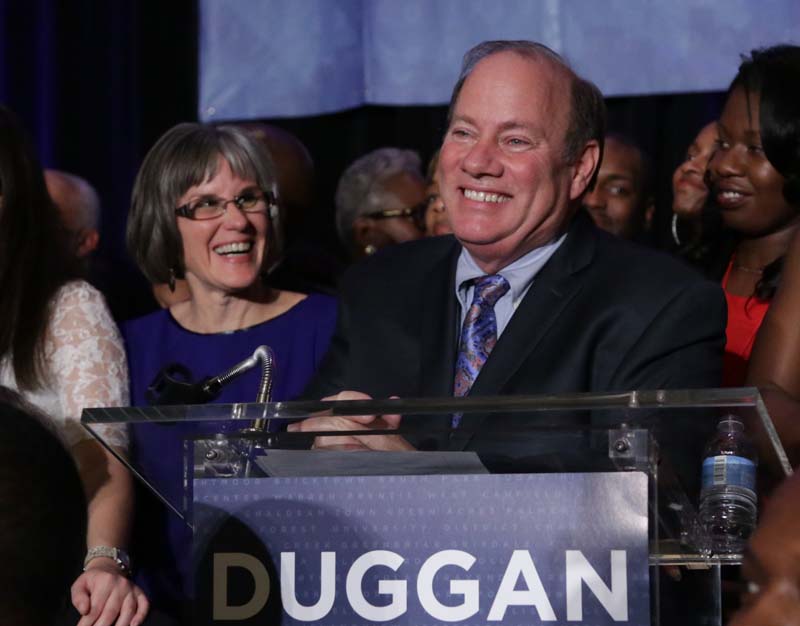New private Duggan fund to support 'Detroit’s agenda'
Detroit Mayor Mike Duggan has started down the well-worn path of raising private money for pet projects – but he is hoping to avoid the pitfalls of other Michigan politicians.
Duggan last week hosted a $1,000-a-plate fundraiser birthday bash for himself along the Detroit River for the Detroit Progress Fund, a nonprofit formed in February to support “the Mayor of City of Detroit’s agenda,” according to records filed with the state.
It’s a 501(c)(4) nonprofit organization, known by its origin in the U.S. tax code. Such funds are created ostensibly to promote social welfare, like homeowners associations and volunteer fire departments. But they are also allowed to participate in political activity, though politics can’t be their main focus. Controversy has surrounded their growing role in politics because such funds are not required to identify who donates to them. Critics say this provides a discreet way for special interest groups to curry favor with office holders.
The Detroit Progress Fund will “pay for some city-related needs that we don't currently have the budget for,” Duggan spokesman John Roach said. One potential expense may include paying the travel bills of job candidates from out of state who are being interviewed for high-ranking city jobs, he said.
By creating a social welfare nonprofit, Duggan joins many politicians, including disgraced former Detroit Mayor Kwame Kilpatrick and Gov. Rick Snyder. Kilpatrick’s fund helped lead him to prison, and Snyder’s to embarrassment.
Duggan hopes to avoid their missteps by promising to disclose who gives to the fund and how it spends its money. “The fund will be transparent in terms of who is donating to it and how much, as well as where the money is being spent,” Roach said in an email.
Roach did not say how or when the fund would disclose donors or spending. As a nonprofit, it only has to file annually with the IRS and in those filings it does not have to disclose all donations and all spending.
Avoiding missteps
The Kilpatrick Civic Fund created a stir early in Kwame Kilpatrick’s administration when critics alleged he used the money for his campaign, something forbidden by the IRS. Years later, Kilpatrick was convicted in federal court on charges he used the fund for personal and political purposes.
When formed, the Kilpatrick fund stated that contributions would be used to help keep Detroit voters informed and help local youth; the ex-mayor’s federal public corruption trial showed some of the money was spent instead on personal luxuries, including golf clubs and birthday parties for the mayor and his family.
In 2012, Snyder scrapped his New Investment to Reinvent and Diversify, or “NERD”, fund – which paid, in part, the salary of one of his top assistants – after the fund’s existence drew media attention. At the time, the NERD fund did not disclose donors or spending, raising questions among critics about who was supporting the governor and what, if anything, they may have received in return.
For Duggan, the Detroit Progress Fund provides yet another avenue for supporters to show their love. It joins his campaign fund and a Super PAC – Turnaround Detroit – which raised and spent more than $3 million in support of Duggan during his successful 2013 bid to succeed Mayor Dave Bing.
By having a Super PAC, Duggan is in the minority of politicians at the municipal level. Most candidates who have benefitted from Super PACs have run statewide or national campaigns.
The resident agent of the Detroit Progress Fund is attorney Thomas Bruetsch, whose online bio lists him as fund secretary as well. Bruetsch also represented Duggan when his candidacy for mayor was challenged last year. He did not return a call seeking comment.
Sandra Svoboda is WDET's bankruptcy reporter and runs the website NextChapterDetroit.com. Mike Wilkinson is a staff writer at Bridge magazine. They collaborated on this story for the Detroit Journalism Cooperative, which is supported by The James L. Knight Foundation, The Ford Foundation and Renaissance Journalism’s Michigan Reporting Initiative.
See what new members are saying about why they donated to Bridge Michigan:
- “In order for this information to be accurate and unbiased it must be underwritten by its readers, not by special interests.” - Larry S.
- “Not many other media sources report on the topics Bridge does.” - Susan B.
- “Your journalism is outstanding and rare these days.” - Mark S.
If you want to ensure the future of nonpartisan, nonprofit Michigan journalism, please become a member today. You, too, will be asked why you donated and maybe we'll feature your quote next time!


 Duggan was feted last week at a $1,000-a-plate fundraiser for a new nonprofit that supports “Detroit’s agenda”
Duggan was feted last week at a $1,000-a-plate fundraiser for a new nonprofit that supports “Detroit’s agenda”